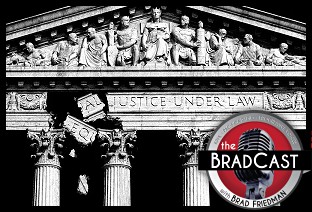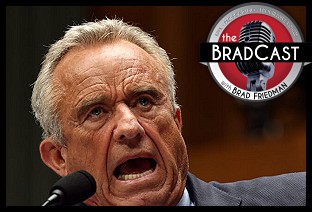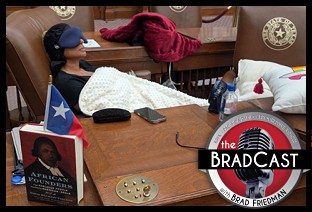 Election 2013 is but a memory --- good or bad --- for much of the nation. But, in Virginia, election officials, attorneys and partisans will still be busy as elves throughout much of the holiday season, and potentially even beyond, determining final results of the statewide November 5th Attorney General's election this year.
Election 2013 is but a memory --- good or bad --- for much of the nation. But, in Virginia, election officials, attorneys and partisans will still be busy as elves throughout much of the holiday season, and potentially even beyond, determining final results of the statewide November 5th Attorney General's election this year.
Last week, on the day before Thanksgiving, Virginia's Republican AG candidate Mark Obenshain filed for a recount [PDF] of the incredibly close race at the Richmond Circuit Court. Two days prior, his Democratic challenger Mark Herring had been certified by the state as the winner of the race by just 165 votes out of more than 2.2 million votes cast early last month.
Should those state-certified results hold, Herring would replace Republican Ken Cuccinelli as Virginia's AG. Cuccinelli was unsuccessful in his own run for Governor in November against Democrat Terry McAuliffe. Along with the Democratic win in the Lt. Governor's race as well, a Herring victory would result in the first time since 1969 that Democrats held all three statewide offices, and the first time in twenty years that Virginia will have a Democratic AG.
A "recount", in Virginia, however --- as we've documented previously (see last section of this article) --- amounts to much less than it may seem, given the technology used in the state and some of the ridiculous "recount" laws specified by the Virginia election code [PDF].
As bad as those "recount" statutes are, however, a margin of 165 votes could certainly be reversed, even in a state where most votes are currently recorded (either accurately or inaccurately, who knows?) by 100% unverifiable Direct Recording Electronic (DRE, usually touch-screen) voting systems, and where the rest are tallied (either accurately or inaccurately, who knows?) by paper-ballot optical-scan tabulators that will be used once again to "recount" (either accurately or inaccurately, who knows?) most of the state's paper ballots.
Yes, that's right. Hundreds of thousands of 100% unverifiable electronic votes cast in the closest statewide race in VA state history cannot be "recounted" now in any meaningful way. For those votes, state election code specifies that, during the "recount", election officials will merely recheck the voting machine computer printouts from Election Night to make sure the certified results match. Meanwhile --- and short of a court order --- votes that were cast on paper ballots will simply be run through the same optical-scan computers that tallied them the first time, after they've been reprogrammed to set aside all ballots which the scanner sees as an over vote, an under vote or a write-in vote in the AG's race. Those set aside paper ballots, at least, will then be examined by hand, in public, by actual human beings.
As ridiculous as the VA "recount" statute is, the "contest" law --- another procedure which the candidate who loses the "recount" may file thereafter --- is even more ridiculous. But, depending on the results of the "recount", that may be the only option Obenshain is left with...and it could result in a GOP "victory", even with fewer recorded popular votes, presuming there are enough heavily partisan Republicans in the VA state legislature...
'Winning' by 'Recount'
Given the unreliability of optical-scan paper ballot tabulation systems --- they can offer inaccurate results for any number of reasons, including malfunction, purposeful manipulation and/or their inability to read certain marks on the ballot correctly --- the odds of Obenshain overcoming his slim deficit in order to prevail over Herring are anyone's guess. A single machine with a dirty optical-scan lens on Election Night --- or one that fails in some fashion during the "recount" --- could produce enough differing results to flip the election.
Moreover, according to the currently certified statewide results on the VA State Board of Elections (SBE) website, there were just over 28,000 more votes recorded in the Gubernatorial race on November 5th than there were in the Attorney General contest. That means, in theory, that there are at least 28,000 ballots that were previously recorded with no vote at all (either accurately or inaccurately, who knows?) in the AG race.
According to Reuters, Obenshain's attorney Stephen Piepgrass says "as many as 25,000 to 50,000 under votes have yet to be counted." That number seems very high, particularly as many of the known under votes were recorded via DREs, on which under votes can't be re-checked for accuracy (at least short of a very lengthy and difficult forensic analysis of each voting system by computer scientists, a process not called for by state statute, one that is difficult, expensive and time-consuming, not to mention generally opposed by the manufacturers of voting systems which historically consider such investigations an intrusion into what they consider to be their own proprietary hardware and software.)
Still, in what is said to be the closest statewide race in history, with just 165 votes --- .007% of those cast --- currently separating "loser" and "winner", there are likely more than enough under votes alone to give Republicans hope of flipping the results during the "recount".
On the downside for the GOP, however, many of the jurisdictions which use paper ballots, versus unverifiable DREs, lean heavily Democratic. For example, the single largest jurisdiction in the state, Fairfax County, uses paper ballots, but the Democratic Herring reportedly defeated the Republican Obenshain there by a whopping 61% to 39%. With some 306,000 votes tallied in the Gubernatorial race in Fairfax County, there are believed to be just over 3,000 ballots with no vote currently recorded in the AG race. Presuming they are correctly identified by the optical-scanners, those under vote ballots will be examined by hand during the recount process. They could, in that county alone, offer more than enough previously-unrecorded votes for Obenshain to reverse the statewide results. They would, however, have to weigh heavily in Obenshain's favor, which would seem unlikely given the currently recorded results. On the other hand, op-scan systems can fail for unpredictable --- and sometimes, unknown --- reasons, so who knows?
The last statewide "recount" was in 2005, also in the AG race that year. In that one, then state Delegate (currently Governor) Bob McDonnel (R) was certified the winner over state Sen. Creigh Deeds (D) by 323 votes before the "recount" began. McDonnell ended up picking up 37 more votes than Deeds in the "recount", resulting in a final margin of just 360 votes. "Obenshain needs 5 times that swing, & in right direction!," tweeted Daniel Nichanian, formerly of Campaign Diaries, recently.
This year, however, tweets D.C. election attorney Chris Ashby in response, "approx[imately] 100 times the number of paper ballots would be rescanned & hand counted vs. '05 AG recount."
Indeed, following the 2005 "recount", the VA legislature passed a law disallowing the purchase of DRE voting machines. That means that the state has been slowly moving to paper ballot optical-scanners over the past eight years as voting systems get replaced with newer ones by local jurisdictions. There will be much more to actually "recount" this year than in 2005, both by hand and by optical-scan.
In Alexandria, according to the Washington Post, all paper ballots cast --- there were 41,214 recorded votes in the Gubernatorial race --- will most likely need to be counted by hand. That, at least, is a victory for the voters in the city of Alexandria, who, unlike most jurisdictions across the state, will be able to have some assurance that their votes were ultimately counted as per their intent (presuming the chain of custody for paper ballots there has been secure from Election Day up through a public hand-count in mid-December.)
There, the city uses optical-scan systems made by Austin-based Hart InterCivic which, according to their Registrar Tom Parkins, cannot be reprogrammed for the "recount" as per state law which requires that the machines be set to count only the race being "recounted", and to set aside ballots otherwise not read as votes by the machine.
"Because of the technology we use, I don't believe we can isolate the attorney general race," Parkins is quoted by WaPo's Patricia Sullivan. "If that's the case, we'll have to recount manually." He said, however, he didn't mind. "I think we actually prefer a manual recount because it's speedier," he said, explaining that the Hart scanner used in Alexandria is a precinct-based scanner which accepts just one ballot at a time, pausing as it tabulates each one separately.
The idea of allowing these systems to be reprogrammed at all at this point in such a close election is likely one that sends shudders up the spine of many e-voting system experts who understand the sensitivity of these systems and how easily they can be incorrectly --- or nefariously --- programmed.
"In 3 of 4 recounts w/ [a] certified margin [of less than] 300 [votes]," Ashby tweeted last week, citing this FairVote article, "the certified loser prevailed in the recount." That could certainly be good news for Obenshain. "On the flip side," Ashby continued, "in 6 of 7 recounts w/ certified margin [greater than] 300 [votes], the certified winner prevailed in the recount." Those data are based on statewide recounts across the country over the past century.
The statewide "recount" in Virginia is likely to begin mid-December, after a date is set by a three-judge panel in Richmond which will oversee the process and make any determinations that local jurisdictions are unable to resolve on their own. Given the automated nature of VA "recounts", officials in a number of jurisdictions have guessed that the process will take just a day or two in each location, barring any surprises.
The results of that "recount" are, ultimately, anyone's guess. What happens beyond it could get even more bizarre...
'Winning' by 'Contest'
Even if Obenshain is still declared the loser after a "recount", he has still another option. So does Herring, for that matter, but it's unlikely to be successful for him if he were the one to come out of the "recount" with the short end of the stick.
It's being referred to by some as the Republicans' "Nuclear Option": an election contest. In most jurisdictions around the country, such post-recount contests --- where a candidate would argue the election or the recount was carried out improperly, or the results of either were tainted by fraud --- would happen in a court of law. In Virginia, however, election contests are decided by a majority vote of the 140-member state legislature. Rather than 165 votes out of more than 2.2 million cast, the AG election could be determined by a minimum vote of 71 members of the state legislature.
"They shouldn't be too difficult for Obenshain to round up," Jeff Schapiro of the Richmond Times-Dispatch explained last week. "There are 87 Republican legislators. Many of them don't like one bit that their party could be completely shut out of statewide office."
That's right. Depending on the mood of the Republican-majority legislature, the results of the popular vote wouldn't actually matter. It would be up to those partisans, in a joint session of the state's Assembly and Senate, to vote on who should be the state's next AG.
Such a move could be risky for Obenshain, Schapiro notes, but also potentially worth the risk. "Democrats would almost certainly accuse Obenshain of stealing the election, having overridden the popular vote in an increasingly blue state," he wrote. "A contest also could be high reward. Obenshain would cement his status as his party's titular leader and its likely gubernatorial nominee in 2017. But the big issue that year would probably be Obenshain's scheming four years earlier."
Short of something new revealing itself during the "recount", which is certainly a possibility, or the margin narrowing even further during same, there seems little basis currently for Republicans to legitimately argue the election was not carried out properly. (Note: There are a number of points that Democrats could raise if they ultimately filed such a contest --- such as the 40,000 voter purge carried out with the approval of Republican AG Cuccinelli just weeks before the election --- but this article is long enough already, so we'll hold those possible points for another day, as needed.)
Every Electoral Board across the state --- in each county and major city --- is currently run by two Republicans and one Democrat. (State law specifies one member from each of the two major parties on the three-person Boards, plus one more member from the Governor's party. The current Governor, until he's replaced by the Democrat McAuliffe, is Republican McDonnell.) Those Boards, as well as the Republican-majority State Board of Elections, oversaw, approved and certified the post-election canvass and the adjudication of provisional ballots.
While there were a small handful of counties (such as Dem-leaning Fairfax County detailed here and GOP-leaning Bedford County detailed here) that added a significant number of votes to the totals after Election Day during their normal canvassing procedure to double-check against human and, in some cases, computer error, for now, most of those changes have been publicly explained to little controversy.
The only jurisdiction to offer a hint of controversy in the post-election provisional ballot adjudication period was Fairfax. There, the county's Republican-majority Electoral Board decided to allow several more days for provisional voters to come in and argue their case for their ballots to be included in the final tally. The Board did so after a legal opinion was issued by the Republican-majority SBE declaring that attorneys could not argue on behalf of the inclusion of provisional ballots for voters that were not present to make the case, even if those voters had previously given their approval. The state's edict was contrary to procedures Fairfax had previously used and which they had informed voters about again this year. Therefore, the county's Board decided to allow several more days --- right up to the deadline for county certification --- for voters to make their case in person.
In post-certification comments, Obenshain's campaign has mentioned concerns about "uniformity" in vote counting across the state. "We owe it to the people of Virginia to make sure we get it right, and that every legitimate vote is counted and subject to uniform rules," they said in a statement after counties and cities certified their canvassed results one week after the election.
That reference has clearly been meant to lay the potential groundwork for an Equal Protection argument during a contest, as UC Irvine election law professor Rick Hasen details here. If the final margin after the "recount" is less than the total number of votes gained by Herring via provisional ballots in Fairfax County, Republicans could make the argument that those votes should be removed entirely from the final tally.
Remember, of course, that court decisions, such as the U.S. Supreme Court's Bush V. Gore, which found that "uniformity" is required in vote counting (as ridiculous as that argument actually is, given the different ways that votes are tallied already, even within the same county where some are tabulated by DRE on Election Day, others on optical-scan for absentees and provisionals, etc.) Virginia's election contest statute requires only that the partisan legislators be convinced during a contest. Actual legal precedent and case law sort of goes out the window at that point. Partisan preferences may take over instead.
While some Democrats are already suggesting that such a "win" by "contest" for Obenshain would amount to "stealing the election", some partisan Republicans are suggesting he contest Fairfax County's provisional votes which, they argue, should be disqualified since the Republican-majority Electoral Board changed procedures to allow the possibility of more votes --- by supporters of either party --- actually being included in the official finally tally.
That said, according to the provisional ballot results carefully tracked by the Cook Political Report's Dave Wasserman, while 263 provisional votes were ultimately included in the Fairfax County AG totals, Herring increased his margin over Obenshain by just 57 with those votes. Thus, even if all of the Fairfax provisional ballots were to be tossed out of the final tally, Herring would still be the winner of Virginia's 2013 Attorney General's race by 108 votes --- unless, of course, the "recount" reduced the margin to fewer than 108 votes. Then, we may be left to watch the nukes fly in the VA state legislature.
During the last statewide "recount" in Virginia, the 2005 AG race, the final results were not determined until December 21 and that was without an election contest following the "recount". So, yes, this one could potentially go until Christmas and even beyond. Yes, Santa Claus, there is a Virginia --- where they may still be fighting over the November 5th AG's race, even on Christmas Day.
Previously related #VAAG coverage at The BRAD BLOG...
• E-Voting Trouble Reported During Today's Elections in Virginia, New York, and Elsewhere [11/5/2013]
• 'Recount' in Virginia AG Race? Good Luck With That. (But, Perhaps You Can Help) [11/6/2013]
• BREAKING: Thousands of Votes Discovered 'Unaccounted For' in Virginia AG Race [11/7/2013]
• Tallying VA's 'Missing' Op-Scan Votes; And Other Surprises in the Incredibly Close VA AG Election [11/8/2013]
• Down to the Provisionals: 55 Vote Margin (or less) Out of 2.2 Million Cast in Virginia AG Race [11/9/2013]
• BREAKING: Democratic Candidate Takes Lead in Razor-Thin VA Attorney General Tally [11/11/2013]
• Provisional Votes Tallied in Fairfax County, VA - Last Ballots Before Certification of the Razor-Thin VA AG Race [11/12/2013]
• BREAKING: Democrat Mark Herring 'Wins' VA Attorney General Race by 164 Votes Before Final State Certification, Almost Certain 'Recount' [11/12/2013]
• VA AG Race: About That 500+ Vote Republican Pickup in Bedford County [11/20/2013]


 'Green News Report' 9/18/25
'Green News Report' 9/18/25
 MAGA Exploiting Kirk's Death as Their 9/11: 'BradCast' 9/17/25
MAGA Exploiting Kirk's Death as Their 9/11: 'BradCast' 9/17/25 Our Crumbling Courts and Withering Rule of Law: 'BradCast' 9/16/25
Our Crumbling Courts and Withering Rule of Law: 'BradCast' 9/16/25 'Green News Report' 9/16/25
'Green News Report' 9/16/25 After Kirk Murder, First Amendment, But Not Second, Under Attack. Prove Me Wrong: 'BradCast' 9/15/25
After Kirk Murder, First Amendment, But Not Second, Under Attack. Prove Me Wrong: 'BradCast' 9/15/25 Sunday 'False Narrative' Toons
Sunday 'False Narrative' Toons SCOTUS Suspension of 4th Amendment Rights Poses Ominous Threat to Constitutional Republic
SCOTUS Suspension of 4th Amendment Rights Poses Ominous Threat to Constitutional Republic 'Dark Moment for America': 'BradCast' 9/11/25
'Dark Moment for America': 'BradCast' 9/11/25 Kirk Assassinated in UT; Shutdown Battle Takes Shape in D.C.: 'BradCast' 9/10/25
Kirk Assassinated in UT; Shutdown Battle Takes Shape in D.C.: 'BradCast' 9/10/25 Despite Voting Co. Lawsuit, Fox Ready to Shout Fake 'Fraud' Again: 'BradCast' 9/9
Despite Voting Co. Lawsuit, Fox Ready to Shout Fake 'Fraud' Again: 'BradCast' 9/9  'Green News Report' 9/9/25
'Green News Report' 9/9/25 Trump Readies Wars on Venezuela and Chicago: 'BradCast' 9/8/25
Trump Readies Wars on Venezuela and Chicago: 'BradCast' 9/8/25 Sunday 'Big Ball Room' Toons
Sunday 'Big Ball Room' Toons 'Green News Report' 9/4/25
'Green News Report' 9/4/25 RFK Jr.'s War on the Science of Public Health: 'BradCast' 9/4/25
RFK Jr.'s War on the Science of Public Health: 'BradCast' 9/4/25 Trump's 'Cook'ed-Up Mortgage Fraud Claims: 'BradCast' 9/3/25
Trump's 'Cook'ed-Up Mortgage Fraud Claims: 'BradCast' 9/3/25 While We Were Out: 'BradCast' 9/2/25
While We Were Out: 'BradCast' 9/2/25 Hypocrisy Behind RW Opposition To CA 'Election Rigging Response Act'
Hypocrisy Behind RW Opposition To CA 'Election Rigging Response Act' CA's 'Deterrence' Map; Trump's 'Fascist Theatre': 'BradCast' 8/21/25
CA's 'Deterrence' Map; Trump's 'Fascist Theatre': 'BradCast' 8/21/25 Trump's 'Stalinesque' Plot to Whitewash History: 'BradCast' 8/20/25
Trump's 'Stalinesque' Plot to Whitewash History: 'BradCast' 8/20/25 TX GOP Imprisons Dem State Lawmaker in State House: 'BradCast' 8/19/25
TX GOP Imprisons Dem State Lawmaker in State House: 'BradCast' 8/19/25 Trump, Nazis and Trump's Nazified Elections: 'BradCast' 8/18/25
Trump, Nazis and Trump's Nazified Elections: 'BradCast' 8/18/25
 VA GOP VOTER REG FRAUDSTER OFF HOOK
VA GOP VOTER REG FRAUDSTER OFF HOOK Criminal GOP Voter Registration Fraud Probe Expanding in VA
Criminal GOP Voter Registration Fraud Probe Expanding in VA DOJ PROBE SOUGHT AFTER VA ARREST
DOJ PROBE SOUGHT AFTER VA ARREST Arrest in VA: GOP Voter Reg Scandal Widens
Arrest in VA: GOP Voter Reg Scandal Widens ALL TOGETHER: ROVE, SPROUL, KOCHS, RNC
ALL TOGETHER: ROVE, SPROUL, KOCHS, RNC LATimes: RNC's 'Fired' Sproul Working for Repubs in 'as Many as 30 States'
LATimes: RNC's 'Fired' Sproul Working for Repubs in 'as Many as 30 States' 'Fired' Sproul Group 'Cloned', Still Working for Republicans in At Least 10 States
'Fired' Sproul Group 'Cloned', Still Working for Republicans in At Least 10 States FINALLY: FOX ON GOP REG FRAUD SCANDAL
FINALLY: FOX ON GOP REG FRAUD SCANDAL COLORADO FOLLOWS FLORIDA WITH GOP CRIMINAL INVESTIGATION
COLORADO FOLLOWS FLORIDA WITH GOP CRIMINAL INVESTIGATION CRIMINAL PROBE LAUNCHED INTO GOP VOTER REGISTRATION FRAUD SCANDAL IN FL
CRIMINAL PROBE LAUNCHED INTO GOP VOTER REGISTRATION FRAUD SCANDAL IN FL Brad Breaks PA Photo ID & GOP Registration Fraud Scandal News on Hartmann TV
Brad Breaks PA Photo ID & GOP Registration Fraud Scandal News on Hartmann TV  CAUGHT ON TAPE: COORDINATED NATIONWIDE GOP VOTER REG SCAM
CAUGHT ON TAPE: COORDINATED NATIONWIDE GOP VOTER REG SCAM CRIMINAL ELECTION FRAUD COMPLAINT FILED AGAINST GOP 'FRAUD' FIRM
CRIMINAL ELECTION FRAUD COMPLAINT FILED AGAINST GOP 'FRAUD' FIRM RICK SCOTT GETS ROLLED IN GOP REGISTRATION FRAUD SCANDAL
RICK SCOTT GETS ROLLED IN GOP REGISTRATION FRAUD SCANDAL VIDEO: Brad Breaks GOP Reg Fraud Scandal on Hartmann TV
VIDEO: Brad Breaks GOP Reg Fraud Scandal on Hartmann TV RNC FIRES NATIONAL VOTER REGISTRATION FIRM FOR FRAUD
RNC FIRES NATIONAL VOTER REGISTRATION FIRM FOR FRAUD EXCLUSIVE: Intvw w/ FL Official Who First Discovered GOP Reg Fraud
EXCLUSIVE: Intvw w/ FL Official Who First Discovered GOP Reg Fraud GOP REGISTRATION FRAUD FOUND IN FL
GOP REGISTRATION FRAUD FOUND IN FL

































